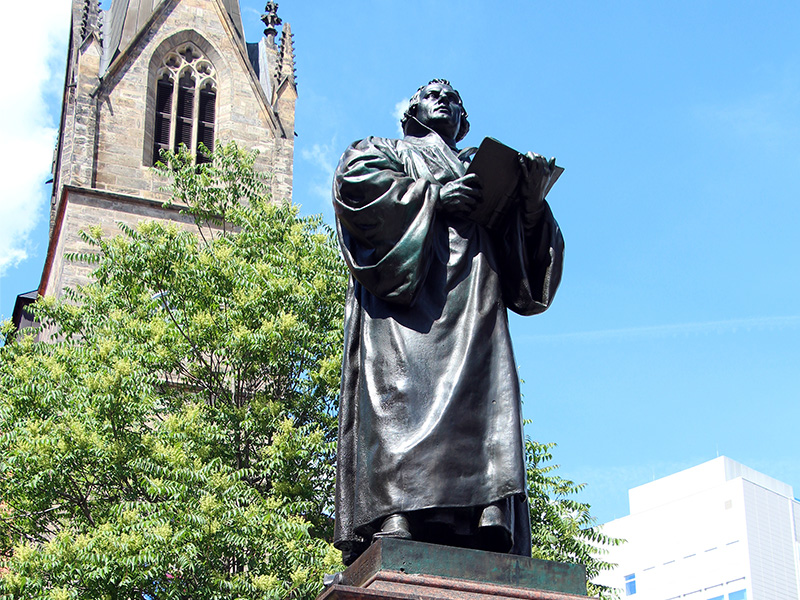
A statue of Martin Luther in Erfurt, Germany, on June 12, 2017. (RNS/Emily McFarlan Miller)
The theological differences that led to the Protestant Reformation 500 years ago have dwindled since in both the United States and Western Europe.
That's the finding of a Pew Research Center survey released Thursday (Aug. 31), weeks before late October's 500th anniversary of the schism in western Christianity.
Among U.S. Protestants, many seem unaware of the differences, voicing beliefs today that are more traditionally Catholic than they are Protestant.
"I think it's fair to say the differences between the two groups have diminished to a degree that might have shocked Christians of earlier centuries," said Greg Smith, associate director of research at Pew Research Center.
"Maybe it's not a huge surprise in the context of modern-day United States, but if you look back at the longer term — at the 500th anniversary of the Reformation — that would be quite surprising to a Christian of 300, 400, 500 years ago."
Of course, Smith noted, no survey data exists to measure responses to the same questions in the 1500s.
According to the survey, more Protestants reported they believe salvation comes through a mix of faith and good works (52 percent) — the traditionally Catholic position — than through "faith alone" (46 percent). That belief — "sola fide" in Latin — is one of five "solas" that form the backbone of Protestant Reformers' beliefs.
The same shares of Protestants also reported they believe Christians should look to the Bible, church teachings and tradition for guidance — the Catholic position — rather than the "Bible alone," or the Protestant belief in "sola scriptura."
Advertisement
Only 30 percent of U.S. Protestants affirmed both sola fide and sola scriptura. Belief in both doctrines was higher among white evangelical Protestants (44 percent) than white mainline Protestants (20 percent) or black Protestants (19 percent) and jumped even higher (59 percent) among white evangelicals who reported they attend church at least once a week.
U.S. Catholics, in contrast to Protestants, voiced beliefs more in line with the teachings of their church: 81 percent reported both good deeds and faith were needed to get into heaven, and 75 percent reported Christians should look to the Bible, church teaching and tradition for guidance.
And while differences between Catholics and Protestants once led to wars and persecution, most U.S. Catholics (65 percent) and Protestants (59 percent) now agree they have more in common than not.
The U.S. survey of more than 2,500 adults, funded by the Pew Charitable Trusts, was conducted online from May 30 to Aug. 9. The margin of error for results based on each sample in that survey is plus or minus 2.9 percentage points.








